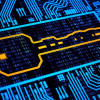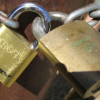Today's secure cipher-text may be tomorrow's open book
In the indictment that led to the expulsion of ten Russian spies from the U.S. in the summer of 2010, the FBI said that it gained access to their communications after surreptitiously entering one of the spies' homes, during which agents found a piece of paper with a 27-character password.
In other words, the FBI found it more productive to burglarize a house than to crack a 216-bit code, despite having the computational resources of the U.S. government behind it.
That's because modern cryptography, when used correctly, is rock solid. Cracking an encrypted message can require time frames that dwarf the age of the universe. That's the case today. But within the foreseeable future, cracking those same codes could become trivial, thanks to quantum computing.









































































